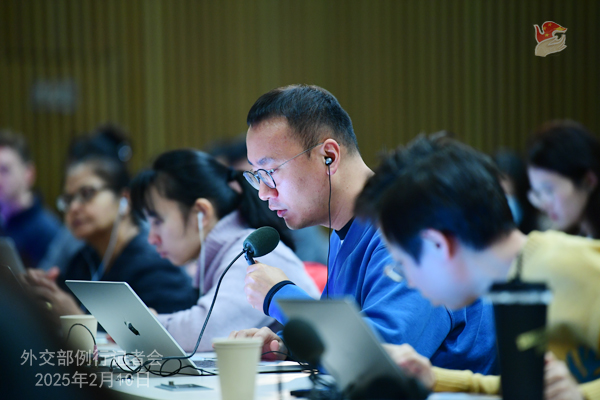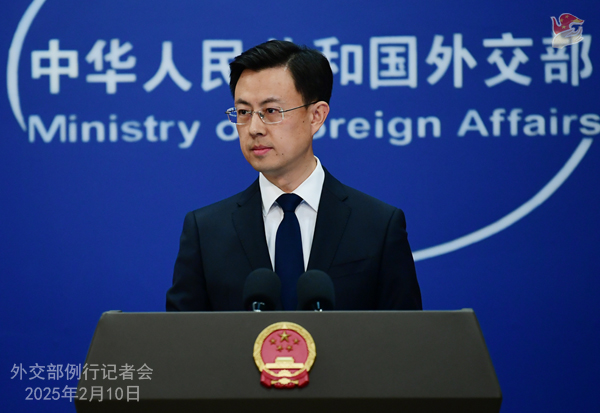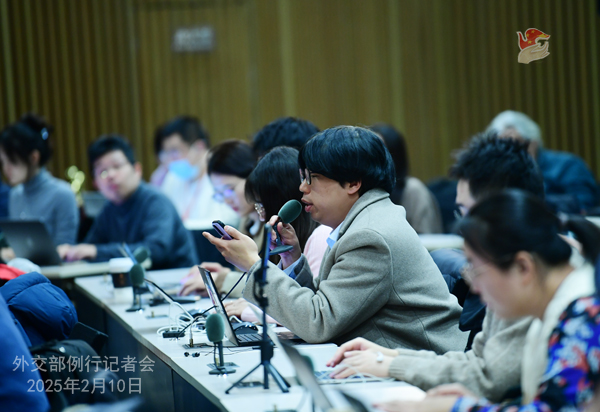At the invitation of U.K. Foreign Secretary David Lammy, Tánaiste and Minister for Foreign Affairs and Trade of Ireland Simon Harris and Chairman of the Munich Security Conference (MSC) Christoph Heusgen, Member of the Political Bureau of the CPC Central Committee and Minister of Foreign Affairs Wang Yi will visit the U.K. and co-chair the 10th China-U.K. Strategic Dialogue, visit Ireland and attend the 61st Munich Security Conference in Germany from February 12 to 17. At the MSC, he will speak at an event on China to share China’s position on major international issues in light of the theme of the conference.
As the rotating President of the U.N. Security Council for February, China will hold a Security Council high-level event on February 18 under the theme of “Practicing Multilateralism, Reforming and Improving Global Governance.” Foreign Minister Wang Yi will chair the Security Council event in New York.
At the invitation of Foreign Minister Ronald Lamola of G20 President South Africa, from February 20 to 21, Foreign Minister Wang Yi will attend the G20 Foreign Ministers’ Meeting in Johannesburg, South Africa.
CCTV: What is China’s expectation for Foreign Minister Wang Yi’s visit to the U.K. and Ireland? What are the topics that Foreign Minister Wang Yi will focus on when he shares China’s position at the MSC?
Guo Jiakun: China and the U.K. are both permanent members of the U.N. Security Council and major economies in the world. Closer communication and cooperation between the two countries benefit both sides and the wider world. In November last year, President Xi Jinping and Prime Minister Keir Starmer had a meeting during the G20 Summit, providing strategic guidance for jointly writing a new chapter of the sound and steady development of the bilateral relations. Foreign Minister Wang Yi’s visit is an important step for delivering on the common understandings between the two leaders. The two sides will hold the China-U.K. Strategic Dialogue to have extensive and in-depth strategic communication on bilateral and global issues, deepen mutual trust and cooperation, jointly steer the bilateral relations toward steady and sustained growth, and add confidence and impetus for world peace, stability, development and prosperity.
Ireland is China’s strategic partner for mutually beneficial cooperation. Over recent years, bilateral relations have enjoyed a sound growth momentum. Last year marked the 45th anniversary of diplomatic ties between the two countries. As the new government of Ireland was just formed, China hopes that Foreign Minister Wang Yi’s visit will bring the two countries closer together for greater consensus, more cooperation and deeper friendship, so as to realize better and faster growth of the China-Ireland strategic partnership for mutually beneficial cooperation and contribute to the sound and steady development of China-Europe relations.
The Munich Security Conference is an annual forum of global significance for international strategies and security policies. China has sent high-level representatives to the conference many times. Against the background of a fast-evolving world fraught with instabilities and transformations unseen in a century, Foreign Minister Wang Yi will elaborate on China’s propositions at the conference on building a community with a shared future for mankind and advancing an equal and orderly multi-polar world.
Yonhap News Agency: According to Russian media reports, President Xi Jinping has accepted the invitation to the 80th anniversary of the Victory Day in Russia on May 9. Will President Xi Jinping visit Russia?
Guo Jiakun: China and Russia are comprehensive strategic partners of coordination for a new era. Our two sides maintain close interactions at various levels. For your specific question, I have no information to share at the moment.
Xinhua News Agency: Could you tell us the considerations for Foreign Minister Wang Yi to chair this United Nations Security Council high-level open debate?
Guo Jiakun: This year marks the 80th anniversary of the victory of the World Anti-Fascist War and the 80th anniversary of the United Nations. This is an important occasion to be commemorated by all and a historical juncture of taking stock of the past and envisioning the future. This high-level open debate at China’s initiative will revisit the founding mission of the U.N., draw a blueprint for a better future and herald the beginning of a series of events in commemoration of the 80th anniversary of the U.N.
In the face of various global challenges, including increasingly salient insecurity and disorder, unbalanced development and dysfunctional international governance, it’s the call of our times and the shared responsibility of countries to reform and improve global governance. The U.N. Summit of the Future last September adopted the Pact for the Future, putting forward ambitious action-oriented proposals for reinvigorating multilateralism and transforming global governance. We hope this high-level open debate will be an opportunity for parties to review the course of the U.N. history, reaffirm solemn commitment to multilateralism, demonstrate firm resolve to defend the purposes and principles of the U.N. Charter, step up cooperation at the U.N., the Security Council and other multilateral platforms, speed up the implementation of the Pact for the Future, and contribute more wisdom and strength to building a more just and equitable global governance system.

The Associated Press: I want to ask about the visit of the prime minister of the Cook Islands to China this week. It’s reported that China and the Cook Islands will sign a comprehensive strategic partnership. New Zealand has expressed concern that the Cook Islands has not properly consulted with New Zealand about this coming agreement or partnership. Can you comment at all on that situation?
Guo Jiakun: The Cook Islands is an important partner of China in the South Pacific. Since establishing diplomatic relations in 1997, our two countries have respected each other, treated each other as equals, and sought common development, achieving fruitful outcomes in exchanges and cooperation in various areas. China stands ready to work with the Cook Islands for new progress in bilateral relations. As for the visit you mentioned, we will release information in due course.
On the special relationship between the Cook Islands and New Zealand, China believes that both New Zealand and the Cook Islands are important cooperation partners of China. China stands ready to grow ties and carry out cooperation with Pacific Island countries, including the Cook Islands. The relationship between China and the Cook Islands does not target any third party, and should not be disrupted or restrained by any third party.
China Daily: Recently Chinese AI company DeepSeek launched an open source model free for commercial use with outstanding performance and lower training cost than similar products, attracting extensive attention and heated discussion in the world. What is your comment on this?
Guo Jiakun: For specific issues that require professional expertise, I’d refer you to competent authorities. Let me stress that in today’s world, continued technological breakthroughs, emergence of new business models and accelerated expansion of applications in AI have become an important driving force for a new round of scientific and technological revolution and industrial transformation.
China is embracing the AI transformation and is working hard to advance AI. We take the safety and security of AI seriously, and support entrepreneurial innovation by Chinese companies, thus contributing China’s part to global AI development. China is also an advocate of inclusive AI. We have helped developing countries enhance capacity building, advocating that AI technologies should be open sourced and there should be greater accessibility to AI services so that the benefits of AI can be shared by all countries. That said, we are against drawing lines along ideological difference, overstretching the concept of national security, or politicizing trade and tech issues.
China stands ready to enhance exchange and cooperation on AI. We are committed to governing AI for good and for all, creating an open and inclusive environment for the development of AI, and together seeking deep in this field of vast possibilities.
CRI: Namibia’s founding father and first president Sam Nujoma passed away at the age of 95 on February 8. Can I have your comment on that?
Guo Jiakun: China expresses deep condolences over the passing of former president Sam Nujoma and heartfelt sympathies to his family and the government and people of Namibia.
A freedom fighter and revolutionary leader, former president Nujoma led the Namibian people in the quest for national independence and liberation. As Namibia’s founding father, he is loved and esteemed by the Namibian people and made outstanding contribution to humanity’s peace and development.
Former president Nujoma was also one of the founders of China-Namibia friendship and made important contribution to the growth of China-Namibia relations and China-Africa relations. At this time of grief, the Chinese people firmly stand with the Namibian people and together draw strength from our shared grief to further advance China-Namibia and China-Africa friendship and common development.
Reuters: This is a clarification on the previous question on the Cook Islands. Can you confirm if the Prime Minister is visiting China this week?
Guo Jiakun: I answered a relevant question just now. We will release information in due course. Please stay tuned.
Beijing Daily: What’s China’s expectation of the G20 Foreign Ministers’ Meeting?
Guo Jiakun: As a major platform for international economic cooperation, the G20 needs to advocate the spirit of partnership, pool efforts to promote global economic growth, set the pace in making global governance more just and equitable, and help countries achieve common development and prosperity. China stands ready to work with all parties to make this meeting a productive one, and send a strong message of supporting multilateralism, strengthening solidarity and cooperation, and jointly responding to global challenges.
Bloomberg: Beijing is compiling a list of U.S. tech firms to target with antitrust probes and other tools as part of efforts to influence tech executives that are close to President Trump. This is according to a Wall Street Journal report today. The goal apparently was to come up with ways to negotiate with the Trump administration on U.S.-China issues including on tariffs. Do you have any response to this report?
Guo Jiakun: I am not familiar with what you mentioned. China opposes overstretching the concept of national security and politicizing trade and tech issues. We are committed to fostering a market-oriented, law-based and world-class business environment. The Chinese market sees all countries as equals and is equally open to companies from all countries.

Global Times: It’s reported that a few days ago, U.S. President Trump met with Japanese Prime Minister Shigeru Ishiba. In the Joint Leaders’ Statement, the two leaders emphasized the importance of maintaining peace and stability across the Taiwan Strait, opposed any attempts to unilaterally change the status quo by force or coercion, and expressed support for Taiwan’s meaningful participation in international organizations. They reaffirmed that Article V of the U.S.-Japan Treaty of Mutual Cooperation and Security applies to the “Senkaku Islands,” and opposed China’s “unlawful maritime claims, militarization of reclaimed features, and threatening and provocative activities in the South China Sea.” The US also said the two countries will strengthen cooperation against China’s economic aggression. What’s China’s comment?
Guo Jiakun: The part of the U.S.-Japan joint statement on China constitutes open interference in China’s domestic affairs, and an attack and smear against China, which is also aimed at scare-mongering in the region. China deplores and firmly opposes this, and has lodged serious protests with the U.S. and Japan.
The Taiwan question is purely China’s internal affair and is at the core of China’s core interests, which brooks no external interference. Both the U.S. and Japanese governments have made serious commitments to China on the Taiwan question. In particular, Japan bears serious historical responsibilities for its aggression against Taiwan and colonial rule over the island, and should all the more act prudently on the Taiwan question. The biggest threat to peace in the Taiwan Strait at present is the separatist activities of “Taiwan independence” forces and the external connivance and support they receive. If relevant countries truly care about peace and stability in the Taiwan Strait, what they should do is to uphold the one-China principle, and unequivocally oppose “Taiwan independence.” The Taiwan region’s participation in the activities of international organizations must and can only be handled in line with the one-China principle. Taiwan has no basis, reason or right to join international organizations that only sovereign countries join.
Diaoyu Dao and its affiliated islands have always been part of China’s territory. China’s activities in relevant waters are fully legitimate and lawful.
China has all along followed the WTO rules. The so-called China’s economic aggression is purely groundless.
We call on the U.S. and Japan to abide by the one-China principle and honor their commitments, immediately stop interfering in China’s internal affairs, stop sending any wrong signal to “Taiwan independence” forces in any form, earnestly respect China’s territorial sovereignty and maritime rights and interests, stop manipulating China-related issues, and take concrete actions to play a constructive role for the peace and development in the region.
Bloomberg: President Trump has said he plans to impose 25 percent tariffs on all imports of steel and aluminum. This broadens his trade salvos and threatens ties with some of the U.S. top trade partners. He said the tariffs applied to imports of the metals from all countries and apparently they come into effects on Monday U.S. time. Would the ministry like to respond?
Guo Jiakun: I’d refer you to the competent authorities for the specific question you asked. Let me stress that protectionism leads nowhere, and trade and tariff wars have no winners.
NHK: Have the Chinese tariff hikes on U.S. products officially come into force today? Are there any arrangements for talks or consultation between the Chinese and U.S. presidents on tariffs?
Guo Jiakun: On your first question, I’d refer you to the competent authorities. Let me stress that trade and tariff wars have no winners and undermine the interests of both Chinese and American peoples. What is needed now is not more unilateral tariffs but dialogue and consultation based on equality and mutual respect. We urge the U.S. to correct its wrongdoing and stop politicizing and weaponizing trade and economic issues.
On your second question, China made its position amply clear to the U.S. and the two sides agreed in principle on mutually beneficial cooperation during the phone conversation between the two presidents on January 17. I also stressed just now that what is needed now is not more unilateral tariffs but dialogue and consultation based on equality and mutual respect.
Reuters: Today is the deadline for countries to submit their new climate pledges on Nationally Determined Contributions to the UNFCCC secretariat. Is China going to honor this deadline?
Guo Jiakun: China has always been a doer in climate response and is firmly committed to green and low-carbon development. We attach great importance to climate response and actively implement the national strategy of actively responding to climate change. We will continue our effort of honoring the pledged goals on carbon peak and carbon neutrality in our own way and at our own speed.
We have made positive progress in implementing the nationally determined contributions (NDCs) targets. Our carbon emissions intensity has kept decreasing, the share of non-fossil fuel in total energy consumption has steadily increased, and the forest stock volume and the total installed capacity of wind power and solar power have hit the goals we pledged to the international community ahead of schedule. China will continue to make concerted efforts to cut carbon emissions, reduce pollution, pursue green development, and boost economic growth, accelerate green transition in all respects of economic and social development, adhere to the goals and principles set out in the United Nations Framework Convention on Climate Change and the Paris Agreement, and contribute to global response to climate change.
China is now working to set the new NDCs in accordance with the Paris Agreement and the requirements of the first global stocktake. We will uphold a proactive and responsible attitude, take into consideration our domestic conditions, capability and stage of development, and inform the UNFCCC secretariat of China’s 2035 NDCs this year in due course.

Related Posts
China eyes upholding genuine multilateralism during WEF meeting

















